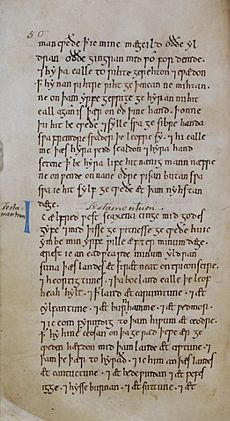Æthelweard (son of Alfred) facts for kids
Æthelweard (died 920 or 922) was the younger son of Alfred the Great, a famous King of Wessex, and his wife, Ealhswith. He was born around the year 880.
Early Life and Education
Æthelweard was King Alfred's youngest son. A writer named Asser wrote about King Alfred's life around 893. Asser tells us important details about Æthelweard's childhood. Unlike his older brother Edward and sister Ælfthryth, who grew up at the royal court, Æthelweard went to a special school.
At this school, called a schola, Æthelweard learned to read and write. He studied both Latin and Old English. He also learned about the liberal arts, which included subjects like grammar, logic, and arithmetic. Many other noble children, and even some from less wealthy families, attended this school with him. This type of education would have started when he was quite young.

Wealth and Land
King Alfred helped Æthelweard become a very rich landowner. In his father's will, written between 873 and 888, Æthelweard is called Alfred's "younger son." He received many estates, or large pieces of land, across southern Britain.
These lands included places like Arreton on the Isle of Wight, and areas in West Sussex, Hampshire, and Wiltshire. He also received land in Dorset, Somerset, and many parts of Devon. In addition, he inherited almost all of his father's property in Cornwall. This made him a very powerful and wealthy person in the kingdom.
Later Life and Family
From the late 890s, Æthelweard signed several important documents, known as charters, for his brother Edward. This shows he was involved in royal affairs.
According to a historian named John of Worcester, Æthelweard passed away on October 16, 922. He was buried in Winchester Abbey. His brother Edward, who died in 924, was buried there soon after. Another historian, William of Malmesbury, also confirms Æthelweard's burial place. However, William says Æthelweard died four years before Edward.
William of Malmesbury also wrote that Æthelweard had two sons named Æthelwine and Ælfwine. Sadly, both sons died fighting in the Battle of Brunanburh in 937. This was a very important battle in English history.
Æthelweard's sons were buried at Malmesbury Abbey. Their cousin, Æthelstan, who was King at the time, asked for them to be buried there. King Æthelstan himself was buried at Malmesbury Abbey just two years later. If Æthelwine and Ælfwine did not have children, then Æthelweard's direct family line would have ended with their deaths.
 | Percy Lavon Julian |
 | Katherine Johnson |
 | George Washington Carver |
 | Annie Easley |

